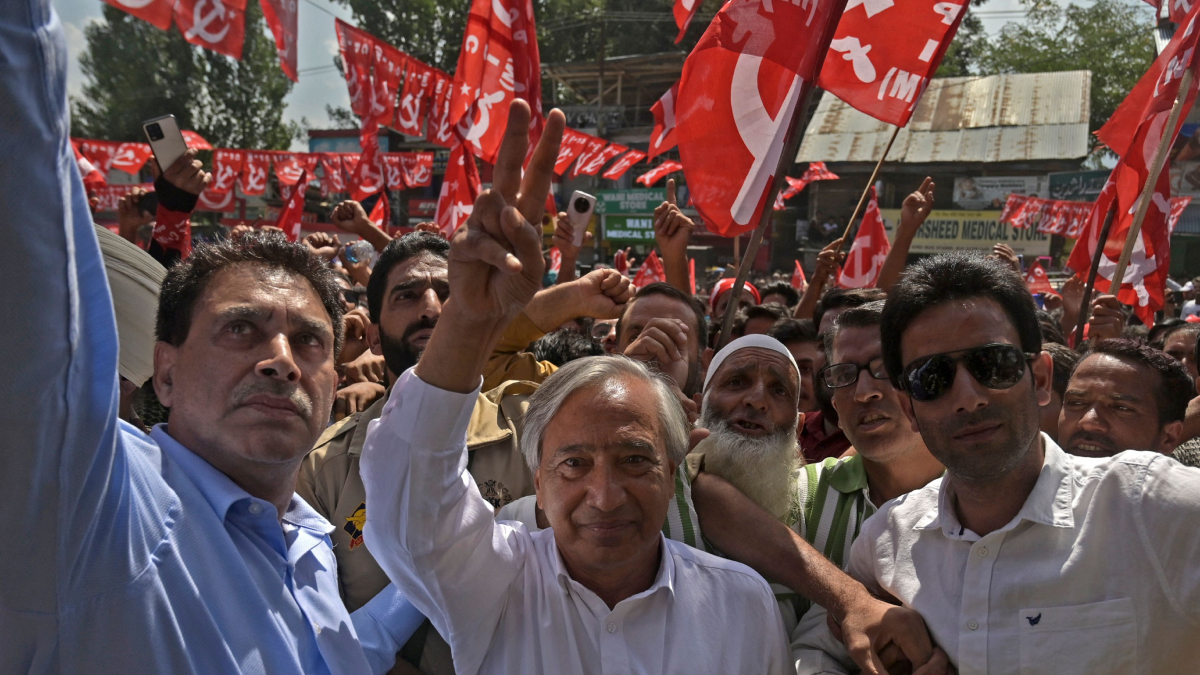CPI(M) leader Mohammed Yousuf Tarigami is a veteran politician who has been a witness to Jammu and Kashmir's tumultuous political history. He secured his fifth term in the assembly from Kulgam in south Kashmir.
Edited excerpts from an exclusive interview:
How different was this election from those of the past?
This election was held after a long time. The last elections were held in 2014, and that assembly was dissolved in 2018. This is the only assembly in India where there has been no election for such a long period. That makes these elections unprecedented and unique. That’s why the people of Jammu and Kashmir were enthusiastic about using the opportunity to shape their future.
You prevailed in Kulgam, which was one of the constituencies that was keenly watched.
It was challenging because the Jamaat-e-Islami (JeI) continues to be an abandoned organisation, but they were facilitated by the government to contest as independents. There is no denying that everybody has the right to contest. However, certain questions remain: the JeI has been advocating the implementation of the right to self-determination and accession with Pakistan, and has been seen promoting armed struggle. All of a sudden, there is this U-turn. Why?
They have to explain it to the people. Additionally, the government of India has accused mainstream parties like the National Conference, Congress, PDP and CPI(M) of appeasement towards the secessionists, yet they are promoting individuals who, until recently, have been indulging in separatism. How do we reconcile this collusion between two extremes―the BJP and the JeI―converging somewhere in Kulgam, the most suited place? That made it more interesting and challenging.
ALSO READ | Who’s Tarigami, the CPI(M) leader who won J&K’s Kulgam for fifth consecutive time?
What is the message from the verdict?
The message is loud and clear. For some, it is a surprise, but for me, as a student of politics, it’s not. They are underestimating the strength and the capacity of the people to think about their future. They are taking the people for granted. That is how they made a mistake in judging the mood of the populace. These elections have demonstrated that they know the right time for the right things to be done. Whenever there is an opportunity, they grab it. This time, an opportunity was presented to the people of Kashmir, and they seized it.
Historically, certain autonomy was provided to us by the Constituent Assembly of India, not as a concession or an appeasement, as the BJP has been claiming, but after a debate in the Assembly. It was a contract between the leadership of Jammu and Kashmir and the Indian Union. That bond was unilaterally abrogated, assaulted, not with debate or discussion, nor taking stakeholders into confidence, but by imposing restrictions, including shutdowns of internet and telephone facilities. Have you seen that happening anywhere while deciding the fate of a people and putting them in a prison-like situation? This happened in Kashmir. Now, the people of Kashmir got an opportunity to express themselves; they don't accept what you have done. Our voice is unanimous in rejecting this treatment, which is undemocratic and unconstitutional.
The results have also highlighted a regional divide. How do you intend to bridge this divide between Jammu and Kashmir?
That is true. Unfortunately, the policies of the BJP government, instead of unifying people, have been dividing them on the basis of faith, caste, and creed. That is what they have been practising across the country. However, the alliance will reach out to every section of people in Jammu. That remains our agenda, and we are very conscious that we can’t do without Jammu. They are a part of us, and we are a part of them. Together, we have to work for a better future.
How do you intend to deliver on the promises made to the people in these elections?
We did not make promises that are sky-high. We will put their concerns on the floor of the house. I told the people in my constituency that I don’t want to promise false dreams. Dreaming of a better future is not a sin.
ALSO READ |Analysis: What Haryana, Jammu & Kashmir Assembly election results tell us
But this assembly will have limited powers?
The government has been talking about the restoration of statehood. If they have been sincere about it, why did they introduce the second amendment in the J&K Reorganisation Act on the eve of the elections? That amendment disempowers the assembly and empowers the unelected appointee of the Centre, the lieutenant governor of Jammu and Kashmir.
Now, we have limited opportunity to discuss these issues. We have an assembly, and Tarigami and others will talk about the issues facing the people with legitimacy. If the LG doesn’t listen to us, at least the country will.



